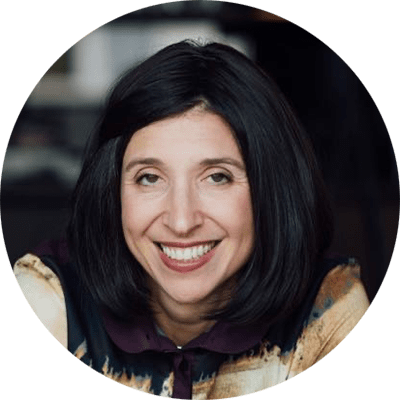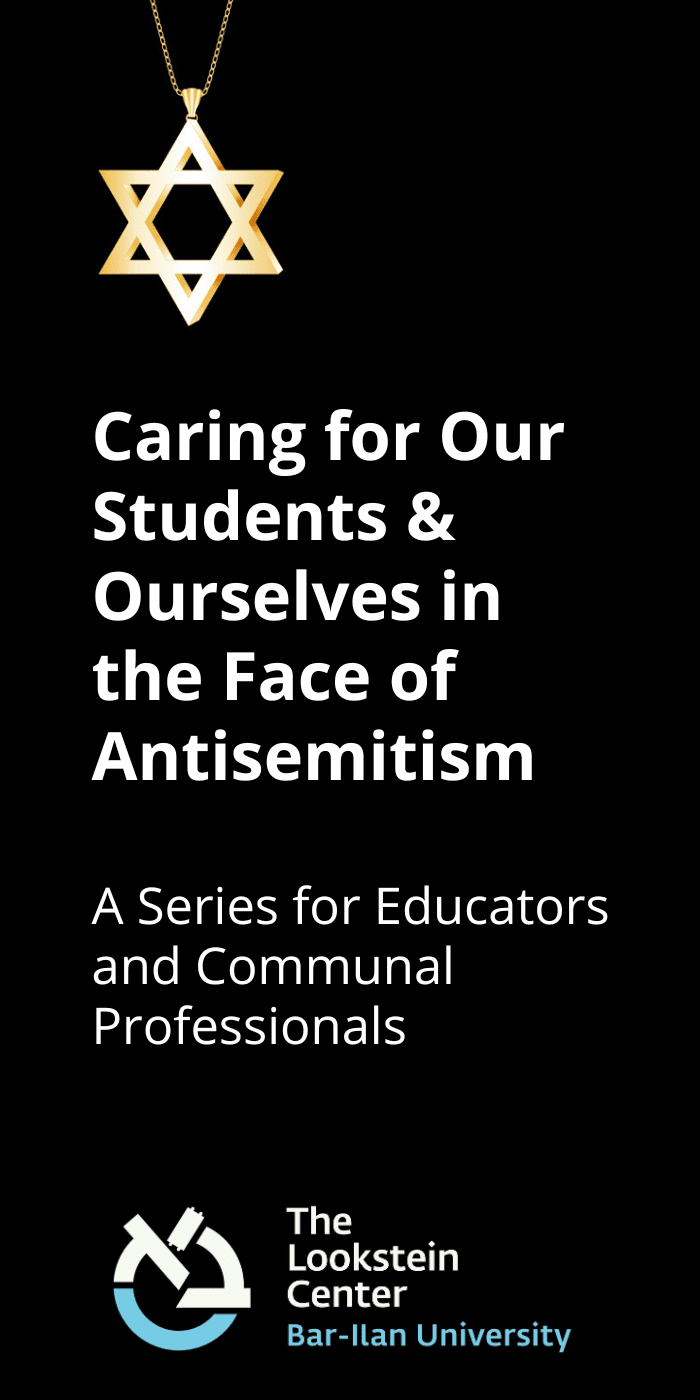Changing the Image of Jewish Studies Teachers: A Case Study

Joanne Greenaway is Chief Executive at LSJS. She worked as a lawyer for 13 years in international arbitration before focusing fully and professionally on the Jewish community. She created the first female role within the Beth Din, helping people in difficult cases of Get refusal. Joanne has a degree in Modern Languages from Cambridge University and a Post-Graduate Diploma in Law. She is a graduate of the LSJS Susi Bradfield Educational Leadership program, the Chief Rabbi’s Ma’ayan program, and the JLC Gamechangers Senior Leadership program. She was named as one of the 40 under 40.
In the UK, to become a qualified teacher, graduates need to train as part of a government accredited program. LSJS (the London School of Jewish Studies) runs such programs with a number of different training routes across primary and secondary sectors.
Over the last 15 years, LSJS has frequently received anecdotal evidence from graduates of its training programs of feeling undervalued in their school environments. They often express frustration with their status, their pay, and their lack of leadership prospects in school, in contrast to the relatively high status of those teaching general subjects. And although we are witnessing a shift towards expectations that teachers should have a professional qualification, the negative attitudes towards Jewish studies teachers persist, perhaps serving as a contributing factor to the shortage of applicants for Jewish studies positions, particularly in the primary sector, and problems with long term retention.
In that context, we developed the “Teach to Lead” (or “Lehorot”) initiative. This initiative was designed to develop leadership skills and growth trajectory for talented teachers, to help bolster the personal and public image of the Jewish studies teacher, and increase retention amongst talented teachers through significant investment in them.
In order to recruit quality applicants, including those who may otherwise have been tempted into other professions, the program was designed to be prestigious and selective with a rigorous, full-day assessment procedure for applicants. Aside from the standard employment-based teacher training program for Jewish studies teachers, it incorporated leadership development through a specialist faith-based provider based at Oxford University, mentoring with members of our professional team as well as with headteachers, an evening program of enrichment sessions including Jewish and leadership studies, bringing perspectives and connections from a global range of experts, and a practitioner-focused trip to Israel. Additionally, it offered an academic program giving credits towards the LSJS Master’s degree in Jewish Education which enables teachers and school leaders to further develop their careers and areas of special interest.
We attracted a much larger than usual pool of applicants and were able to select the five strongest, most of whom had significant youth leadership experience. At the close of our two-year pilot (July 2022), we take this opportunity to reflect on our graduates and what we have learned from them and from this process.
What can we learn from the experience of these five graduates: Davida, Sara, Chana, Mark, and Rachel? Our observations, and the evidence from three feedback surveys, a baseline survey at the start of the course, a mid-way point survey at the end of year one, and a third survey at the conclusion of the program, revealed the following portraits.
Davida
Clearly a rising star with a strong youth leadership background, Davida benefited from the mentoring opportunities provided through the program—she was paired with a headteacher from a large, leading local school—and she sought other opportunities within her school context. Her positivity, growth mindset, and blend of confidence and humility made her well placed to maximize learning and put it into practice. She got involved in informal education through lunchtime and morning tefilla sessions as well as growing in her formal pedagogy and enjoying the academic certificate aspect of the program which helped her develop as a reflective practitioner. She signed up to continue with LSJS to Master’s level. With the skills she learned on the program, she has started to contribute to school-wide conversations about their Jewish studies vision, curriculum, and approach. She is ambitious and keen to impart her own style, yet conscious of the steep learning curve ahead and sensitive about “treading on toes.” Her self-awareness really developed through the leadership seminars on the program giving her space to reflect on her strengths, weaknesses, personal style, and impact. Together with her blend of resilience and idealism, this will stand her in good stead.
Sara
Sara’s school experience left her demoralized and dissatisfied. She felt a lack of alignment between the school’s objectives, the children’s abilities, and the lack of support of their parents, concluding that the school’s expectations were simply not realistic. From the outset she was concerned about making Jewish studies relevant, meaningful, and engaging. She saw the importance of putting learners at the center of their learning rather than teaching them what we want to teach them. She struggled with the concept of teaching texts to students with no textual background and limited language skills, and felt constrained in her ability to impart spirituality. While the program sought to share perspectives on these issues and build confidence, ultimately as a realist and a thinker, these issues troubled her greatly and seemed insurmountable. Coupled with the issue of low pay, she felt that she couldn’t make a future out of teaching and also support a family. She left the program partway through the second year, but returned the following year to take on a full-time educational position in a different institution.
Chana
A talented educator with experience running her own educational programs, Chana started Teach to Lead full of enthusiasm. She took maternity leave mid-program and was not able to be fully immersed in the remainder of the content, sometimes joining for part of sessions on Zoom with her camera off. It was clear that the program had come at the wrong time in her life to devote her energies to her career. One objective she had for the program was to improve her home/school balance and to become better at delegating and managing the various demands on her time as she developed as a leader. She was grateful for the supportive framework of the program, although between the disruptions of COVID and those of childbirth she was not able to benefit as much as she would have liked. She also highlighted her need for a higher salary.
Mark
A dynamic and enthusiastic teacher based in a primary school setting, Mark really appreciated the broader, stimulating experience of being part of a mixed primary/secondary cohort. He enjoyed the reflective opportunities, the attention of the small group sessions and the opportunities to meet with many experts in the field both locally and internationally. Motivated by the program, he is keen to be part of a movement of professionalizing Jewish studies teaching and expanding its horizons, particularly developing links between Jewish and secular subjects and integrating students’ challenging questions. However, he felt demoralized as he did not see development opportunities within his school setting. He found the head of his Jewish studies department to be less than encouraging of new ideas and initiatives. Mark could not yet envisage being able to put his new skills into practice within his current school framework.
Rachel
Also based in a primary setting and a former committed and highly regarded youth leader, Rachel benefitted enormously from the program and gave very positive feedback about the way in which she learned to think more broadly about education and her role as a teacher, particularly from the additional Jewish Studies enrichment program and the opportunities to explore her ideas in the mentoring sessions. The leadership seminars helped her to become increasingly assertive and seek opportunities to lead assemblies and curriculum development initiatives. She married towards the end of the program and now plans to make Aliya next year.
Reflection
How can we learn from this set of experiences and outcomes as we plan future programs? We can break this into a number of areas.
Markers for future success
We built an intensive screening process for the participants. Having run the program, it has become clear that to justify the significant investment in each participant, there are certain personal characteristics that serve as markers for greater chance of success. A positive attitude and growth mindset are critical. We must be sure not to underplay the challenges in schools, but to empower the participants to be part of the solution. Like Davida, they need to be idealistic enough to believe in their mission despite the relatively low remuneration, yet resilient and gritty enough to cope with the day-to-day realities. Selecting those who are ambitious for their teaching, yet self-reflective enough to see the journey they will need to travel, will be key to the success of future investment.
Culture of support
Regarding the program itself, the leadership development component of the program really brought these personal skills to the fore and, together with the wider incentive package, also enabled us to attract this caliber of applicant. Importantly, as Mark’s experience shows, we must work increasingly closely with schools to support and provide opportunities for the trainee, allowing them to pursue their interests and contribute from their areas of expertise.
Planning for the unknown
Woven into each participant’s feedback there was also an additional element of strain that the COVID experience brought for trainee teachers, with the need to adapt their teaching just as they were beginning their teaching careers. COVID was not the only major life event that got in the way. Participants had babies, got married and decided to emigrate.
Cleary, program-planning and school structures must be flexible enough to take real-life issues and life changes—marriage, birth, aliya, health, etc.—into account. Like Chana, teachers may need parenting breaks, so we might want to find ways for them to move in and out of training programs and the teaching system beyond. Aliya opens opportunities for individuals to continue to contribute, albeit in different ways, from afar. And while we could not have anticipated COVID or the role it played in our participants’ lives and their school experiences, the ability to make changes dynamically was a valuable learning opportunity.
A closer look at the numbers
While many evaluations look exclusively at the metrics, and the metrics can offer valuable insights, when they stand as the sole factor in evaluation, they can be misleading. As a proportion, the roughly 50% drop out rate seems high when looking at the investment per student. Compared to professions such as law, however, we know that at least this rate of attrition is to be expected. (As a former lawyer, I was one of three out of a cohort of sixty still practicing after ten years.) We learned the importance of being selective in identifying the talent that we invest in and that investment in talent can pay off.
We will watch closely where Davida, Sara, Chana, Mark, and Rachel are in three years. Whether they will continue to work in, or with, UK Jewish schools remains to be seen: we intend to go back to them at the end of each year for the next 3-5 years to watch their teaching journey unfold. We are convinced that those who remain in the system will have a huge impact on their students, and that those who make other choices will nonetheless continue to make an important contribution to the wider Jewish world.



Joanne Greenaway is Chief Executive at LSJS. She worked as a lawyer for 13 years in international arbitration before focusing fully and professionally on the Jewish community. She created the first female role within the Beth Din, helping people in difficult cases of Get refusal. Joanne has a degree in Modern Languages from Cambridge University and a Post-Graduate Diploma in Law. She is a graduate of the LSJS Susi Bradfield Educational Leadership program, the Chief Rabbi’s Ma’ayan program, and the JLC Gamechangers Senior Leadership program. She was named as one of the 40 under 40.
Reach 10,000 Jewish educational professionals. Advertise in the upcoming issue of Jewish Educational Leadership.





